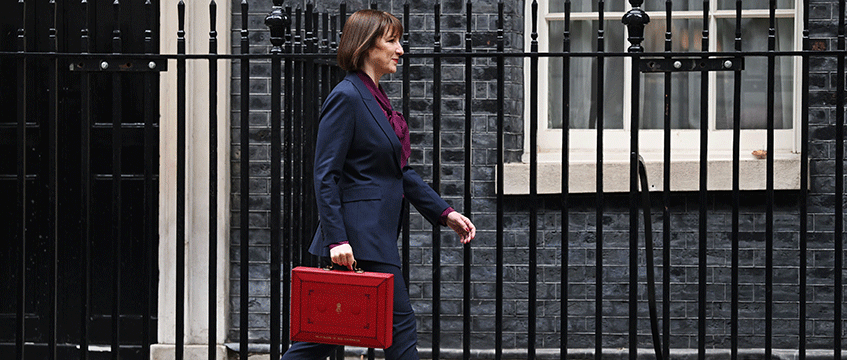An anticipated announcement on business rates reform has left much to be desired among the real estate sector, with the government’s promise to deliver a fairer business rates system labelled as “robbing Peter to pay Paul” and “absolute madness”.
Chancellor of the exchequer Rachel Reeves announced the government would deliver “permanently lower” business rates multipliers for retail, leisure and hospitality businesses from 2026-27.
She said some £1.9bn of support would be provided to small businesses by freezing the small business multiplier and providing 40% relief on bills up to £110,000 for retail, leisure and hospitality businesses. Relief currently stands at 75%, while the reduction in the multiplier for retail, leisure and hospitality is to be funded through a higher rate for warehousing, a move Keith Cooney, head of business rates at Knight Frank, branded as “short-sighted”.
“Government is effectively taxing the infrastructure that these businesses rely on to move goods to their premises and directly to the consumer,” he said.
British Property Federation chief executive Melanie Leech said without an overall concession on the business rates burden, the Budget announcement was tantamount to “just robbing Peter to pay Paul”.
She added: “The chancellor has at least recognised the business rates system is broken and has signposted the direction towards a reformed system. In the meantime, recognition of the unsustainable burden on retail, leisure and hospitality sectors and measures to continue to support them are welcome, but alongside the employer tax increases announced, don’t go far enough to provide our high streets with the protection they need today.”
Ari Boyd, chief financial officer at investor Aprirose, said: “While the 75% hospitality relief that is set to end in April will be changed to 40%, this will still add almost £500m to the sector which will undoubtedly risk jobs, investment and the overall high street as businesses scramble to cope.”
Boyd added: “The impact on the whole value chain linked to hospitality would be massive: from reducing margins, which impacts rent cover, yields and valuations and banking covenants, literally no one would be isolated from this – lenders, landlords, operators of all shapes and sizes, jobs.”
‘Many will feel betrayed’
Gerald Eve head of business rates Simon Green said the decision to slash relief from 75% to 40% was “absolute madness” and would see rates bills more than double overnight for 250,000 small businesses.
“These sectors continue to suffer from the long-term effects of the Covid lockdowns, a fall in consumer spending and a move away from traditional bricks-and-mortar retail,” said Green. “Many in the sector will quite rightly feel betrayed given Labour’s manifesto promise to ‘level the playing field between the high street and online giants’.”
He added: “Increasing the UBR paid by larger properties by 1.7% brings the tax rate to an eye-watering 55.5%, lumping an extra cost of £444m on to 220,000 businesses. This hardly aligns with Labour’s manifesto promise to replace business rates to ‘better incentivise investment’ and ‘support entrepreneurship’.
“It looks like the business community is set for further delay as the government engages with stakeholders about changes that at best seem likely to lead to mere tinkering around the edges. This falls woefully short of what they were hoping for.”
‘Dismal day’
John Webber, head of business rates at Colliers, said it was a “dismal day” for the high street and set it up for “potential disaster”.
“The chancellor’s announcements concerning business rates today were desperately disappointing,” said Webber. “Despite pre-election promises of business rates reform, nothing of significance was announced. There is to be no consultation, just a discussion document, and the measures announced hardly put a sticking plaster over the gaping wound, rather than bringing in any fundamental reform.”
He added: “The chancellor’s measures potentially are driving the sector to the wall. By replacing the current 75% discount to business rate bills with a discount of 40%, those businesses currently eligible for the relief will see their business rates bills actually rise by a massive 140% next year. Like the government before her, the chancellor has failed to tackle the business rates issue. There has been no pledge for business rates reform across the board, no attempt to freeze the larger multiplier or to bring it to a sustainable level that businesses can afford, nor to tackle the business rates deserts we see in some parts of the country.”
Stakeholder feedback
The government’s Transforming Business Rates paper, published immediately after the Budget announcement, seeks to gather feedback from stakeholders about how it can “best deliver” a transformed system.
It states: “The business rates system cannot be transformed overnight and the government believes the best outcomes will be achieved by developing reforms in partnership with businesses and other stakeholders through a process of co-design.
“The government will make further improvements over this parliament to deliver a fairer business rates system that is fit for the 21st century – one which delivers on the government’s commitments to provide certainty to businesses, to support the high street and to incentivise investment.”
The paper says any final decisions on reforms will be taken in the context of the government’s wider objectives, including the overall fiscal position “to ensure the sustainability of public finances”.
“Business rates are an important source of revenue for local government and the impact on the local government funding system will be an important consideration in reviewing the tax,” states the paper. “The government will work with local government to ensure longer-term tax changes are accounted for within the local government finance system so that, as far as practicable, local authority funding is unaffected from these tax reforms.”
Image © James Veysey/Shutterstock
Send feedback to Samantha McClary
Follow Estates Gazette











